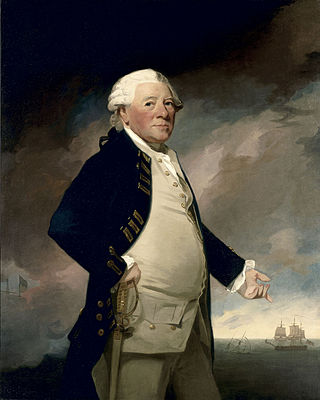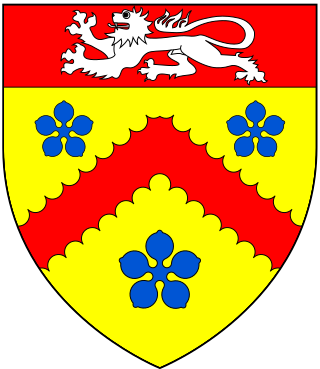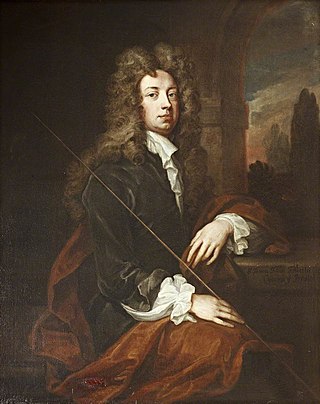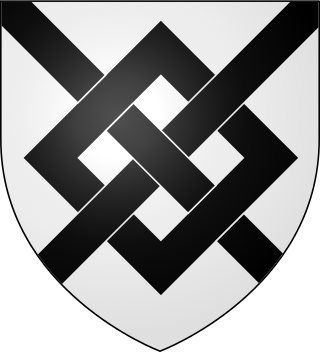
John Hervey, 1st Earl of Bristol was an English Whig politician.

Earl of Stradbroke, in the County of Suffolk, is a title in the Peerage of the United Kingdom. It was created in 1821 for John Rous, 1st Baron Rous, who had earlier represented Suffolk in the House of Commons.

There have been three baronetcies created for members of the Bacon family, all in the Baronetage of England. As of 2008, one creation is extinct and two of the creations are extant. The extant titles have been merged since 1755.

There have been five baronetcies created for persons with the surname Barker, three in the Baronetage of England, one in the Baronetage of Great Britain and one in the Baronetage of the United Kingdom. All five creations are extinct.

The Bunbury Baronetcy, of Bunbury, Oxon and Stanney Hall in the County of Chester, is a title in the Baronetage of England. It was created on 29 June 1681 for Thomas Bunbury, Sheriff of Cheshire from 1673 to 1674 and the member of an ancient Cheshire family. His grandson, Henry, the third Baronet, and great-grandson, the fourth Baronet, both sat as Members of Parliament for Chester. The latter died unmarried at an early age and was succeeded by his younger brother, the fifth Baronet. He was a clergyman. On his death in 1764 the title passed to his eldest son, the sixth Baronet. He represented Suffolk in the House of Commons for over forty years but is best remembered for his marriage to Lady Sarah Lennox. He died childless in 1821 and was succeeded by his nephew, the seventh Baronet. He was the son of Henry Bunbury, younger son of the fifth Baronet. The seventh Baronet was a distinguished soldier and politician. His eldest son, the eighth Baronet, was High Sheriff of Suffolk in 1868, and Fellow of the Royal Society. He died childless in 1886 and was succeeded by his younger brother, the ninth Baronet. He was Liberal Member of Parliament for Bury St Edmunds. He died unmarried in 1895 and was succeeded by his nephew, the tenth Baronet. He was the son of Colonel Henry William St Pierre Bunbury, third son of the seventh Baronet. He served as High Sheriff of Suffolk in 1908 and was a Deputy Lieutenant of the county. On his death in 1930 the title passed to his son, the eleventh Baronet. He was High Sheriff of Suffolk in 1936 and was a Deputy Lieutenant of the county. His son, the twelfth Baronet, was High Sheriff of Suffolk in 1972. As of 2014 the title was held by the latter's second but eldest surviving son, the thirteenth Baronet, who succeeded in 1985.

Lionel Tollemache, 3rd Earl of Dysart, styled Lord Huntingtower from 1651 to 1698, was an English nobleman. A Tory Member of Parliament at Westminster, he inherited Scottish peerages and was briefly Lord Lieutenant of Suffolk from 1703 to 1705.

There have been seven baronetcies created for persons with the surname Parker, three in the Baronetage of England, two in the Baronetage of Great Britain and two in the Baronetage of the United Kingdom. Two of the creations are extant as of 2008. Though none of the different families of baronets were related, several supplied a number of flag officers to the Royal Navy.
The Pickthorn Baronetcy, of Orford in the County of Suffolk, is a title in the Baronetage of the United Kingdom. It was created on 31 January 1959 for the Conservative Party politician Kenneth Pickthorn. A former Master of Corpus Christi College, Cambridge, he was member of parliament for Cambridge University from 1935 to 1950, and for Carlton from 1950 to 1966. As of 2010 the title is held by his grandson, the third Baronet James Pickthorn, who succeeded his father, Charles Pickthorn, in 1995. James' eldest son William Pickthorn is the heir to the Pickthorn Baronetcy.
The Colt Baronetcy, of St James's-in-the-Fields in the Liberty of Westminster in the County of Middlesex, is a title in the Baronetage of England. It was created on 2 March 1694 for Henry Colt, Adjutant to Prince Rupert of the Rhine and member of parliament for Newport and Westminster. The title was created with remainder to his younger brother John Dutton Colt, Member of Parliament for Leominster. Sir Henry died childless and was succeeded according to the special remainder by his great-nephew, the second Baronet. He was the grandson of John Colt.

There have been three baronetcies created for persons with the surname Cooke, two in the Baronetage of England and one in the Baronetage of Ireland. One creation is extant as of 2013.
Sir Edmund Bacon, 4th Baronet was an English politician.
Sir William Armine, 2nd Baronet was an English politician who sat in the House of Commons from 1646 to 1653.
Henry Grey, 1st Lord Grey of Groby was an English landowner, soldier, courtier, magistrate, county administrator, and member of parliament.
The Kemp Baronetcy, of Gissing in the County of Norfolk, was a title in the Baronetage of England. It was created on 14 March 1642 for Robert Kemp. The second Baronet sat as member of parliament for Norfolk and Dunwich. The third Baronet was member of parliament for Dunwich and Suffolk. The fourth Baronet was member of parliament for Orford. The title became extinct on the death of the twelfth Baronet in 1936.

The Elwes Baronetcy of Stoke-by-Clare in the County of Suffolk, was a title in the Baronetage of England held by the Elwys family, whose name through the years has alternately been spelled Helwish, Helewise, Helwys, Elwaiss and Elwaies.

Sir Thomas Felton, 4th Baronet was an English courtier and Whig politician who sat in the English House of Commons from 1690 to 1709.
Sir Henry Felton, 2nd Baronet was an English politician who sat in the House of Commons between 1656 and 1679.
The Mill Baronetcy, of Camois Court in the County of Sussex, was a title in the Baronetage of England. It was created on 31 December 1619 for John Mill, subsequently Member of Parliament for Southampton. The third Baronet was High Sheriff of Hampshire in 1685. The fifth Baronet was member of parliament for Midhurst, Penrhyn and Horsham. The sixth Baronet sat as a Knight of the Shire for Hampshire. The title became extinct on the death of the tenth Baronet in 1835.
There are four extinct baronetcies created for persons with the surname Norton: two in the Baronetage of England, one in the Baronetage of Ireland and one in the Baronetage of Nova Scotia.

Sir Lionel Tollemache, 2nd Baronet PC, of Helmingham Hall in Suffolk, was twice elected as a Member of Parliament for Orford in Suffolk, in 1621 and 1628. He had a considerable reputation as a surgeon, but is said to have made many enemies due to his "immoderate temper".











